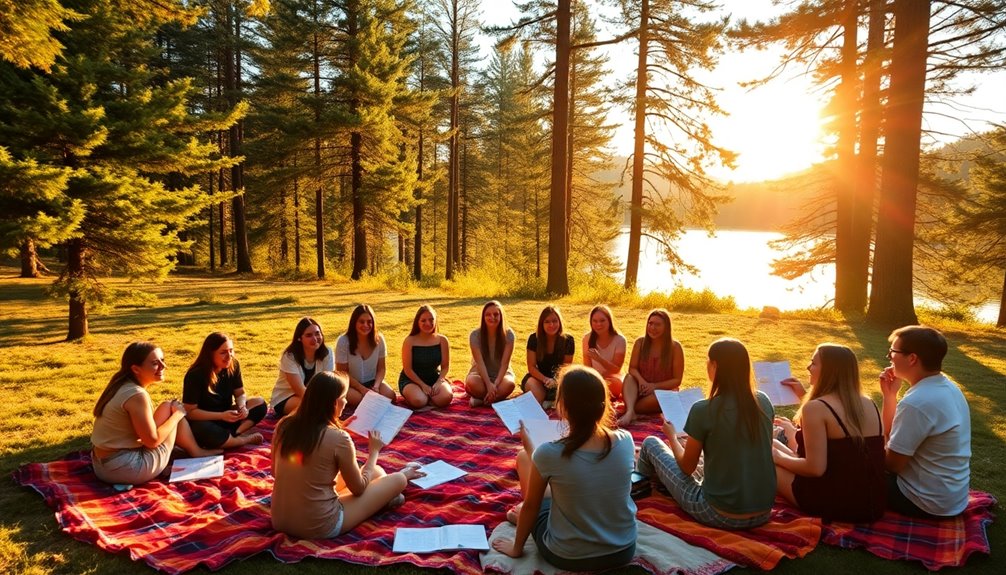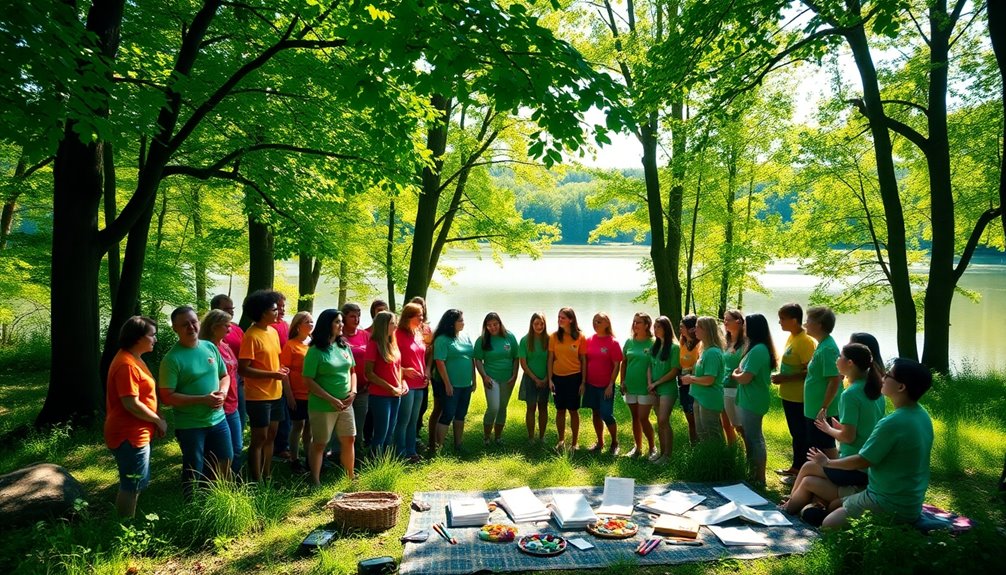For a choir retreat that fosters harmony and growth, start your day with a reflective morning speaker and group prayer. Balance spiritual elements with engaging workshops on vocal techniques and the heritage of sacred music. Incorporate themed rehearsals, like focusing on women composers or nature-inspired pieces. Strengthen community ties through social events and mentorship programs. Don’t forget to explore collaborations with local monastic communities for unique experiences. These elements create a rich environment for learning and connection. If you’re looking for even more activities to inspire your choir, there’s plenty more to explore. Consider incorporating some interactive elements, such as music improvisation sessions or small group discussions that allow participants to share personal stories related to their musical journeys. Additionally, integrating church leadership retreat strategies can help participants develop their skills in guiding and supporting others within their communities. Overall, these thoughtful activities will deepen the choir’s commitment to both their craft and their collective mission.
Key Takeaways
- Begin the retreat with a morning speaker to inspire reflection and set a spiritual tone for the day.
- Incorporate workshops on vocal techniques and the historical heritage of sacred music to enhance skills and appreciation.
- Organize themed rehearsals and community singing events to deepen engagement and foster intergenerational connections.
- Host social events and mentorship programs to strengthen community bonds and integrate newcomers with experienced members.
- Collaborate with local monastic communities for unique insights and enriched spiritual experiences through joint events and workshops.
Retreat Structure and Schedule

When planning your choir retreat, consider a schedule that runs from 9 AM to 3 PM, as this allows plenty of time for both spiritual and musical activities. A well-structured retreat not only enhances the experience for choir members but also fosters a strong community within.
Start the day with a morning speaker, often your pastor, followed by structured reflection and discussion. Incorporate group prayer and the singing of the morning Office to create a shared spiritual atmosphere.
In the afternoon, offer opportunities for outdoor activities like a walk, a second speaker, and spiritual readings. This retreat structure balances educational workshops, communal worship, and personal reflection, enriching the overall experience and deepening connections among members.
Engaging Workshop Ideas

To create an engaging retreat experience, consider incorporating a variety of workshops that cater to different interests and skills.
Vocal technique workshops can significantly enhance your singing abilities, making them a priority for many participants who seek practical benefits for choir rehearsals.
Explore the historical heritage of sacred music to deepen your appreciation for the repertoire, enriching your overall musical experience.
To attract attendance, think outside the box with engaging educational workshops, perhaps by collaborating with local monastic communities. This not only provides unique insights but also fosters spiritual and musical growth.
Lastly, incorporating diverse musical traditions can promote cultural understanding, making your retreat even more enriching and enjoyable for everyone involved.
Building Community Connections

Building strong community connections is essential for any choir, especially in rural areas where personal relationships can thrive.
Focus on organizing social events like post-concert gatherings or community service projects to enhance camaraderie and deepen relationships among members.
Incorporating mentorship programs can effectively integrate newcomers by pairing them with experienced singers, bridging community gaps, and promoting inclusivity.
Encourage ridesharing and carpooling initiatives to facilitate participation during colder months, while also fostering social connections among members who may not know each other well.
Additionally, hold regular feedback sessions to gather insights on member needs and desires, creating an inclusive environment that welcomes diverse voices and experiences within your choir.
Strengthening these connections will enrich your choir's overall experience.
Exploring Musical Themes

Creating strong community connections lays a solid foundation for exploring musical themes during your choir retreat.
Focus your rehearsals on specific themes, like celebrating women composers during Women's History Month, to highlight their contributions to church music. You can also choose nature-inspired pieces, such as "For the Beauty of the Earth," to immerse your choir members in an environmental reflection.
Consider a theme like "A Day in Music," where you select songs representing different times of day, engaging everyone. Pairing these selections with corresponding artworks can deepen the connection between music and visual art.
Lastly, host themed community singing events with familiar folk songs to promote engagement among different generations and backgrounds, showcasing the talents of different conductors as well. Additionally, fostering community and support networks enhances personal development, which can be beneficial for choir members' growth and collaboration.
External Collaboration Opportunities

While you're planning your choir retreat, consider the enriching potential of collaborating with nearby monastic communities. Engaging with these communities gives you a great opportunity to participate in the Daily Office or Mass, enhancing your choir's spiritual experience and musical repertoire.
Many monastic facilities offer visitor accommodations, making it convenient for you to attend retreats or workshops focused on growth. Coordinating joint events can strengthen outreach and foster relationships that promote shared values.
You can also explore collaborative concerts with local religious groups to broaden your audience. Additionally, workshops led by experienced musicians and theologians can help you make new connections and learn diverse musical traditions, enriching your choir's overall experience and performance quality.
Frequently Asked Questions
What Do You Do in a Choir Retreat?
During a choir retreat, you engage in structured sessions that combine musical practice with reflection and discussion.
You participate in group activities that foster a sense of community, sharing personal stories and experiences.
You might enjoy outdoor walks or listen to guest speakers who inspire growth.
Workshops on vocal techniques and music history can enhance your skills.
Plus, sharing meals together creates a relaxed atmosphere, encouraging everyone to bond and connect.
How Can I Make My Choir More Interesting?
Did you know that choirs can boost members' well-being by 40%?
To make your choir more interesting, incorporate thematic workshops that explore different music genres or historical contexts. Organize community singing events with easy folk songs to engage diverse participants.
Highlight works by women composers, especially in March, and create a collaborative atmosphere by pairing pieces with similar themes.
Lastly, use visual arts during performances to enhance the overall experience for both singers and audience.
How Do You Motivate Church Choir Members?
To motivate your church choir members, create a welcoming atmosphere where everyone feels valued.
Organize social events to strengthen bonds and encourage storytelling during rehearsals to deepen connections.
Incorporate diverse musical styles to keep practices fresh and engaging.
Implement mentorship programs pairing experienced singers with newcomers to foster inclusion.
Lastly, regularly seek feedback to understand their needs, ensuring members feel heard and appreciated, which boosts motivation and commitment to the choir.
How Do You Attract New Choir Members?
Imagine a vibrant tapestry woven from voices, each thread vibrant and unique.
To attract new choir members, you should create eye-catching promotional materials that highlight the joy and fulfillment of singing together. Host open rehearsals and community sing-alongs, inviting everyone to experience your choir's warmth.
Encourage current members to share their stories, and consider implementing a mentorship program to ease newcomers in. Exciting themed events can also draw in diverse audiences, sparking interest in joining.
Conclusion
As you plan your choir retreat, remember that 70% of participants find group activities enhance their musical skills and personal growth. By incorporating engaging workshops, community-building exercises, and exploring new musical themes, you'll create an environment that fosters both harmony and individual development. Don't forget to seek external collaboration opportunities—they can open doors to fresh ideas and perspectives. Embrace this chance to strengthen your choir and inspire lasting connections among members!









